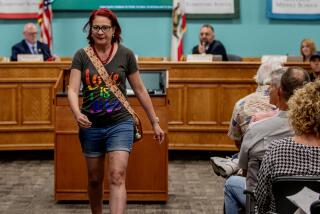School Gives Passing Grade to Cheaters’ List
- Share via
Call it the Dishonor Roll. Granite Bay High School launched a crackdown this year on cheaters: a list of the short-cutters and their crimes, stored on the school’s computer.
“The goal is not to put a black mark on the kid’s high-school career,” said Ron Severson, principal of the 2,000-student high school, 30 miles outside of Sacramento. “The goal is to let kids know honesty and integrity are vital parts of life.”
Staff members with passwords can open the “Academic Dishonesty List,” known informally as the cheaters list, on their computers. Faculty members report incidents to the assistant principal and a secretary updates the list. The teachers receive e-mails about once a month, notifying them when the list has been updated.
At the end of the school year, 68 incidents were logged. Because of multiple infractions, three students had made the list twice. One student appeared three times. Reports had come from 29 teachers.
The faculty discussed changes to the policy earlier this month, although formal adoption comes in August. School officials expect to continue the practice, with revisions, in the fall.
At that time, Assistant Principal Michael McGuire said, the list probably will be available on paper only to teachers who come to his office to report cheaters. One-time cheaters’ names probably will be erased from year to year, he added.
School officials said that the cheaters’ list does not become part of a student’s transcript or prevent seniors from graduating.
Teachers always have had access to students’ disciplinary records, Severson said. The shared electronic list merely simplifies the process.
Teacher Karl Grubaugh appreciates the efficiency.
“In the past, if I wanted to get the rundown on the 70 students in my government or economics class, I had to go the assistant principal’s office with a list and go one by one through the files to see if any cheating had occurred,” said Grubaugh, who helped develop the idea at a faculty retreat last year.
“I didn’t know of anyone who did that,” he said.
Grubaugh last checked the list of cheaters at the beginning of the semester.
“It’s a resource for the hardened few violators out there -- makes them known commodities when they’re coming in the door,” said the 20-year teaching veteran.
Some teachers, however, worry that the new policy takes away their ability to judge kids individually.
“If I was on the list and all the teachers knew, I would withdraw from what I was involved in because of humiliation,” said one history teacher, Brandon Dell’Orto. “For some kids, the best thing you can do is scare them, and then forgive them and pat them on the back.”
The student newspaper ran a front-page feature about the list last month. Jeff Katz, one of the editors-in-chief, said many students did not take the list seriously.
“A lot of people thought it was a joke at first,” the 18-year old said.
But Katz added that he thought the electronic list was a good idea.
“It’s not fair for those who do work, when those who don’t do work get away with it,” he said.
But “I just wouldn’t want to see a person automatically get a bad name for all four years, if they do something bad once in their freshman year.”
About seven parents in the last year have questioned McGuire about the list.
“They wanted to know what it meant. They wanted to know if this was going on permanent records,” he said. “I told them it wasn’t the mark of Cain.”
Teachers announced the new policy in their classrooms, so many parents did not know about the list, McGuire said. Next year, he plans to write an article about the list for the newsletter that goes home to parents.
School officials insist that the school has no more cheaters than any other school. But they acknowledge that the Internet has made plagiarizing and buying papers much easier.
“You can get a high-school level paper on any topic you’re assigned,” Severson said. “For foreign language classes, there are places where kids only have to push a button to translate.”
An expert on student cheating, Donald L. McCabe, said the list “sends a strong signal that the school and faculty are going to be more vigilant. They don’t want students to cheat” and students are not going to get away with cheating as they used to.
But McCabe, founding president of the Center for Academic Integrity based in North Carolina, said he worried that a freely circulated list could unduly prejudice teachers.
He said he prefers a model that allows teachers to deal with cheaters individually.
More to Read
Sign up for Essential California
The most important California stories and recommendations in your inbox every morning.
You may occasionally receive promotional content from the Los Angeles Times.













